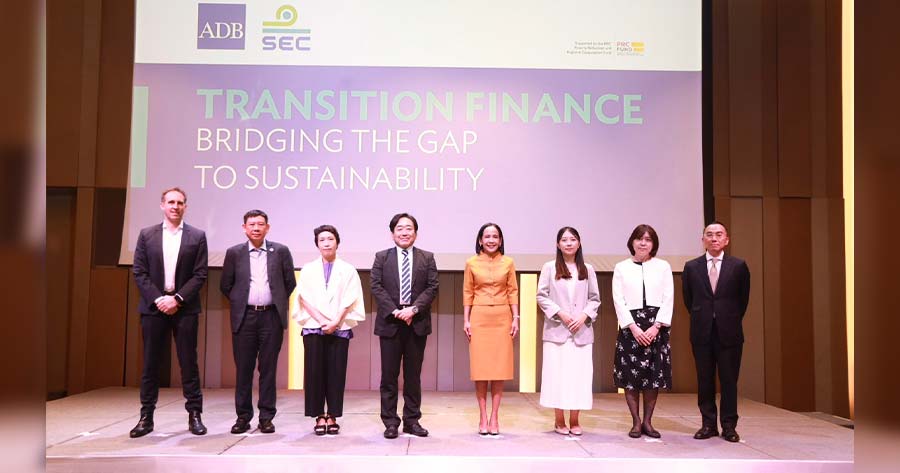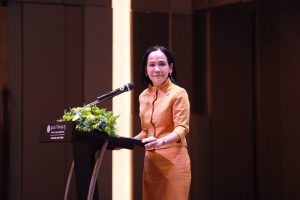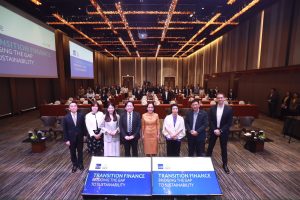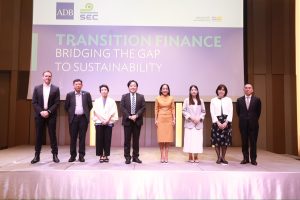Bangkok, 16 September 2024 – The Securities and Exchange Commission (SEC) and the Asian Development Bank (ADB) have co-organized a public seminar on the topic, “Transition Finance: Bridging the Gap to Sustainability,” inviting experts from both local and international organizations to share perspectives and experiences in promoting transition finance towards low-carbon society. The event was held today at Pullman Bangkok King Power Hotel.
This seminar aimed to provide in-depth knowledge and strengthen the capacity of the business sector to raise funds under the framework of Transition Finance, facilitating a credible transition to a low-carbon society. It featured sharing of experiences and perspectives among international experts, focusing on the key elements for developing a transition plan, tools for evaluating and selecting transition activities, as well as investor expectations for promoting transitions. Additionally, the event presented case studies of Thai companies with experience in developing transition plans and defining transition pathways appropriate for their businesses.
Mrs. Pornanong Budsaratragoon, SEC Secretary-General, delivered opening remarks, highlighting the SEC’s commitment to supporting all business sectors towards achieving the Net Zero Carbon Emissions Goal to mitigate the global risk of climate change. Over the past seven years, the SEC has actively promoted corporate governance, a key business foundation of listed companies that takes into consideration the interest of all relevant stakeholders. Additionally, the SEC has outlined a roadmap for developing a sustainable finance ecosystem to ensure effective outcomes.
“The SEC continues promoting Transition Finance, which is a key initiative to achieve the Net Zero Goal. Failure to act could pose a risk to businesses’ survival in an economy moving towards a low-carbon society. On the other hand, successfully expediting the transition can enhance business competitiveness. As it happens, most industries in Thailand still emit high levels of greenhouse gases and face challenges in reducing these emissions. Therefore, it is essential to support these hard-to-abate-sectors in accessing funding to help them transition and gradually reduce their emissions to zero in the future. There are various national and international guidelines available today for businesses to use as reference. For example, Thailand Taxonomy: a Reference Tool for Economic Activities according to Environmental Objectives and the ASEAN Transition Finance Guidance (ATFG). The SEC has participated in developing of both guidelines,” added SEC Secretary-General.
Mr. Satoru Yamadera, Advisor, ADB, highlighted the importance of partnership between the SEC and ADB in advancing sustainable finance in Thailand, which can be replicated throughout the region. Since 2020, ADB has provided hand-holding support to more than 12 sustainable bond issuers across the region, the majority of which are issuers from Thailand. The program has supported over $2 billion of sustainable bond issuances in local currency and resulted in over $12 billion in subsequent issuances, contributing to the development of a sustainable debt capital market. ADB will leverage our experience to further develop and strengthen the sustainable finance ecosystem in Thailand and the region to support the region’s shift towards a low-carbon economy and to offer innovative solutions for emerging areas like transition and biodiversity finance.
The seminar featured sharing on key elements of Transition Finance by international experts and knowledge-sharing sessions on various issues, including operating frameworks and good practices in the use of tools, measurement methods, and disclosures that can be applied in assessing the credibility of a transition plan, led by Ms. Yuki Yasui, APAC Managing Director, Glasgow Financial Alliance for Net Zero (GFANZ). Additionally, Mr. Eugene Wong, CEO, Sustainable Finance Institute Asia (SFIA), shared ASEAN’s recent approaches towards Transition Finance that are appropriate for the economic and social contexts of the region. Mr. Sean Kidney, Co-founder and CEO, Climate Bonds Initiative, stated that achieving the goals of the Paris Agreement requires transition finance during the transition period, which presents an opportunity for Asia to attract investments to transform production processes and transform them towards a low-carbon economy.
Moreover, experiences were shared regarding the development of the Technology Sectoral Roadmap for 10 key industries in Japan by Ms. Eriko Seki, Deputy Director of the Environmental Finance Office, GX Policy Group, Ministry of Economy, Trade and Industry (METI) of Japan. This roadmap aims to facilitate the private sector in referencing the list of technologies, along with the timeline, which have been studied and proven to help reduce greenhouse gas emissions for their investments.
In addition, views and experiences were exchanged with several experts from the financial market, including Ms. Atsuko Kajiwara, Head of the Sustainable Finance Evaluation Group at Japan Credit Rating Agency, who had previously assessed transition bonds issued in Japan, and Mr. Jason Mortimer, Head of Sustainable Investment – Fixed Income and Senior Portfolio Manager at Nomura Asset Management, who shared his perspectives on promoting transition investment. Also participating in the exchange were Mr. Colin Chen, Head of ESG Finance, Asia Pacific at Mitsubishi UFJ Financial Group (MUFG), and Mr. LAU Yat Fei, Head of Sustainability Strategy, Economics and Strategic Planning Department at Bank of China (Hong Kong), who shared their experiences in preparing transition plans and issuing transition bonds for their respective banks.
The seminar concluded with a panel discussion featuring senior executives from leading Thai companies, who exchanged their insights and experiences on developing of transition plans to steer their companies toward achieving the Net Zero goal. The panelists included Dr. Saruda Siriphattarapreecha, Sustainable Development Manager, Fortune Parts Industry PCL, Mr. Nuttavut Intarode, Sustainable Development Director, Siam Cement PCL, Ms. Saowanee Jarusruangchai, Head of Sustainable Development, Central Pattana PCL, and Ms. Pimjai Hoontrakul, Sustainability Director, Minor International PCL. The discussion covered key strategies, challenges and approaches to securing funding. All participants emphasized the need to expedite the transition to a low-carbon economy, underscoring that it must happen at every level of business, from upstream to downstream, as a company’s total greenhouse gas emissions ultimately need to encompass its supply chain, which often represents a significant share of overall emissions.
The interested public can watch the replay of the seminar on the SEC Facebook Page. The Taxonomy and ATFG documents are available for download at https://www.sec.or.th/TH/Pages/LawandRegulations/ResourceCenter-Guidance.aspx








